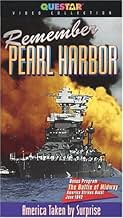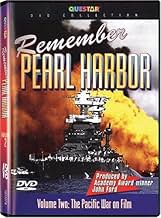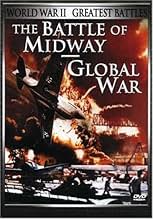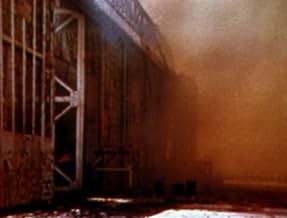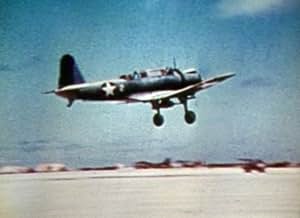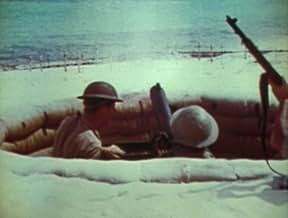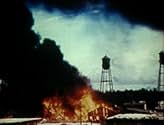IMDb RATING
6.1/10
2.4K
YOUR RATING
The Japanese attack on Midway in June 1942, filmed as it happened.The Japanese attack on Midway in June 1942, filmed as it happened.The Japanese attack on Midway in June 1942, filmed as it happened.
- Director
- Writers
- Stars
- Won 1 Oscar
- 1 win total
Henry Fonda
- Narrator
- (voice)
Jane Darwell
- Narrator
- (voice)
James Roosevelt
- Self - US Army Major
- (as Major Roosevelt)
Donald Crisp
- Main Narrator
- (voice)
- (uncredited)
Irving Pichel
- Narrator
- (voice)
- (uncredited)
Jimmie Thach
- Self - Naval Aviator
- (uncredited)
- Director
- Writers
- All cast & crew
- Production, box office & more at IMDbPro
Featured reviews
There have been many battles in the Second World War that played a part in deciding who the victors of the conflict were going to be, and one of these engagements is known as the Battle of Midway. Like any good ww2 film, this short combines good narration with impressive archive footage that was taken while the battle was ongoing. If that weren't enough, John Ford, one of the greatest geniuses in cinema history, directed this. The film starts with the narrator, Donald Crisp, telling the audience where Midway Island is located and why it holds such significance to the United States military. The film then goes on to show footage of the event that has often been cited as one of the most successful military engagements ever. At Midway, Japanese forces took 20 times the amount of casualties the Americans did, and american carrier aircraft managed to sink all 4 of the aircraft carriers responsible for attacking Pearl Harbor half a year earlier. This all took place only in June 1942, but even just 6 months into America's involvement in the war, they dealt a blow to japan from which they never really recovered. The footage of this event that Ford captured is remarkable because he was so close to the action. Many marines and other servicemen were killed on the island as japanese planes attacked from every conceivable angle, but Ford kept filming. You can see proof of this at one part where the camera gets knocked over by some kind of explosion. Aside from the exciting footage of combat and naval warfare, there isn't too much else to this short. It deserves praise because John Ford risked dying in action in order to record most of it, but at the same time, it's been eclipsed by a lot of other world war 2 related films that also showcase footage of this battle. What makes this one stand out after so many decades is the fact that its director was actually there in the midst of it, something that no modern documentary can boast. Because of this (and the huge interest I have in ww2 things) I have to consider Battle of Midway as one of the most iconic and well made second world war films. It goes without saying that this won an Oscar as well.
This short piece of film shows parts of, as the title already tells us, of the battle of Midway, and some moments after it. The director is John Ford and what he creates with this short documentary is pure Hollywood war propaganda. There is a storyline that even includes the women at home waiting for the fighters. During some scenes a dialogue between Jane Darwell and the great Henry Fonda is heard on the background.
The images of the battle, shot in color, have historic value and are pretty exciting. The heroic tone is easy to understand, although now it is easy to see past that. Everything, including its Oscar win, seems to be there for propaganda purposes, making the people at home feel good enough about the war that is going on. In the end 'The Battle of Midway' is an interesting little film, but not that much more.
The images of the battle, shot in color, have historic value and are pretty exciting. The heroic tone is easy to understand, although now it is easy to see past that. Everything, including its Oscar win, seems to be there for propaganda purposes, making the people at home feel good enough about the war that is going on. In the end 'The Battle of Midway' is an interesting little film, but not that much more.
This documentary, "The Battle of Midway," is a short film shot during the actual combat on June 4, 1942. The Battle lasted from June 3 to June 7, but the air attack on Midway Island was on June 4. This shows the bombing of the U.S. airfield and positions on Midway. It also shows the defenders in action, and one Japanese plane trailing smoke after it was hit by ground fire.
What is most striking about this film is the concussion of the actual bombs, which have a horizontal spreading impact with huge destruction. What one sees in most movies in which battle scenes are staged, is ground explosions that blow up laterally and dissipate in the air with much less near damage.
Hollywood's John Ford was a Navy officer who directed this and other films for the Navy during WW II. Henry Fonda is the principal narrator. There isn't much by way of aerial combat or Japanese aircraft pictured here. Other Armed Forces photography would capture that. But this documentary earns its stars for the men who shot the film while under heavy enemy fire.
What is most striking about this film is the concussion of the actual bombs, which have a horizontal spreading impact with huge destruction. What one sees in most movies in which battle scenes are staged, is ground explosions that blow up laterally and dissipate in the air with much less near damage.
Hollywood's John Ford was a Navy officer who directed this and other films for the Navy during WW II. Henry Fonda is the principal narrator. There isn't much by way of aerial combat or Japanese aircraft pictured here. Other Armed Forces photography would capture that. But this documentary earns its stars for the men who shot the film while under heavy enemy fire.
"The Battle of Midway" is an important historical film. Imagine...film crews were on the island when it was attacked and soon after rushed this short into theaters to celebrate this HUGE American victory. So, from a historical viewpoint it is an important film. BUT, and there is a but here, seen today the film isn't the wonderful film it was proclaimed to be when it was given an Oscar in 1943. I really think the Oscar purely came because of patriotism--Hollywood's attempt to bolster the war effort by heaping praise and awards on films that drummed up love of country and the war. Seen today, the color print is very faded and scratchy but more importantly the narrative sucks. The film was shot with color but was silent--and all sound effects and narration were added later-- and some of the voiceovers were terrible.
The bottom line is that if you want to see a historical document-- see this. If you want to see a good film that explains the battle well, don't! There are much better documentaries on the battle.
The bottom line is that if you want to see a historical document-- see this. If you want to see a good film that explains the battle well, don't! There are much better documentaries on the battle.
John Ford's celebrated 19-minute documentary about America's first major victory of World War Two earned him a shrapnel wound, a Purple Heart and an Oscar. The first 10 is impressive without being that interesting - hard-won battle footage that largely consists of some stuff setting on fire, the camera shaking, the film cutting, then something else setting on fire - though the raising of the flag is a lovely moment, narrator Irving Pichel intoning: "Yes, this really happened". The second half is more obviously Fordian, the elegiac tone reinforced by hymns, slanting shadows and Jane Darwell's frenzied, corny, but effective narration. Audiences wept and fainted during the passage where she urges ambulance-men to rush injured soldiers to a hospital. Ford would make his definitive statement on the war, and the nature of heroism, with 1945's They Were Expendable, but this short is well worth a look.
Did you know
- TriviaDirector John Ford and cinematographer Joseph H. August were wounded by enemy fire while filming the battle.
- Quotes
Main Narrator: Midway Island. Not much land right enough, but it's our outpost. Your front yard.
- ConnectionsEdited into Ils ont filmé la guerre en couleur (2000)
- SoundtracksAmerica, My Country Tis of Thee
(1832) (uncredited)
Music by Lowell Mason, based on the Music by Henry Carey from "God Save the King" (1744)
Words by Samuel F. Smith
Played in the score and later sung by an offscreen chorus
Details
- Runtime
- 18m
- Sound mix
- Aspect ratio
- 1.37 : 1
Contribute to this page
Suggest an edit or add missing content


